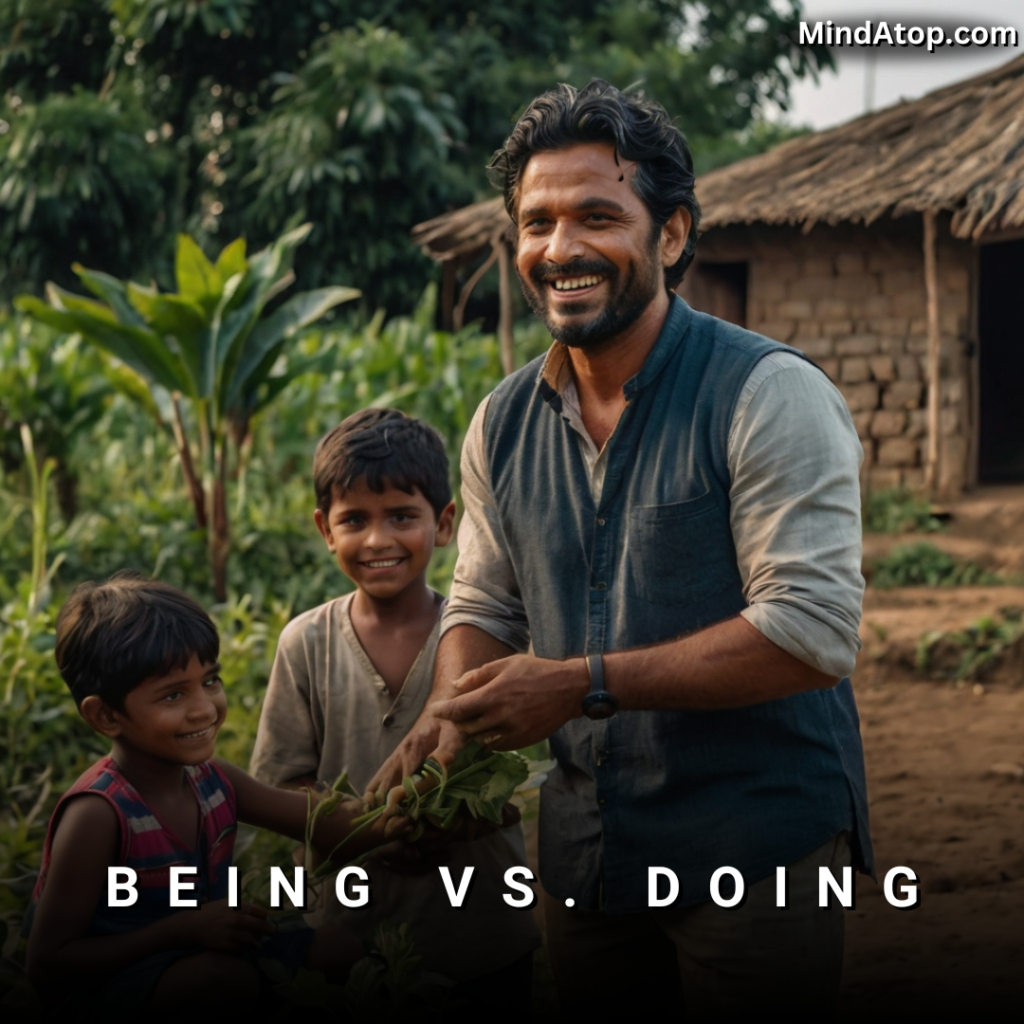Being vs Doing
Being vs Doing: A Powerful Tale of Inner Strength
Tarun never questioned Being vs Doing. He was known throughout the village for his industrious nature. From dawn till dusk, he worked tirelessly in his fields—tilling the soil, sowing seeds, and nurturing crops with devoted care. His consistent efforts yielded abundant harvests every year, earning him both admiration and respect.
One year, however, a severe drought struck the region. The rains failed, and the once fertile land turned to dust. Despite all his efforts, Tarun’s crops withered. He was heartbroken. His entire identity was rooted in his work, and now, with the fields barren, he felt like he had lost himself.
Days turned into weeks, and Tarun became increasingly withdrawn. He spent hours sitting outside, staring at his lifeless fields. The villagers tried to comfort him, reminding him of his kind heart and helpful spirit. But for Tarun, their words fell flat. If he wasn’t producing, what was he worth?
The inner struggle of Being vs Doing, tormented him. He needed more clarity at this time. But he saw himself only through the lens of what he accomplished. Without crops to show, without tasks to complete, he felt like he no longer mattered.
One day, an old sage visited the village. The villagers spoke highly of him, saying he carried wisdom from many years of wandering and reflection. When he heard about Tarun, he paid him a visit. Sitting quietly beside him, the sage finally said, “You are grieving not just the drought but the loss of your role. But you are not what you do, Tarun. Being vs doing is not a battle—you are still you, even when you are still.”
Tarun looked at him, puzzled. The sage smiled gently. “Your worth is not tied to your harvest. It is found in your spirit, your resilience, your presence. Can you be content even when you are not doing?”
The question lingered in Tarun’s mind for days. Slowly, he began to shift. He started spending more time with his family. He sat with his children, told them stories, and helped them with their homework. He visited neighbors and began volunteering at the village school, teaching kids about farming and life.
This new way of living—of balancing being vs doing—felt unfamiliar at first, but it soon brought unexpected joy. Tarun began to smile again. His sense of worth was no longer entirely dependent on the success of his fields. He discovered peace in moments of connection and stillness.
People around him noticed the change. The man who once measured himself only by his productivity now inspired others with his calm presence. Even without the crops, he remained a pillar of the community.
Months passed, and eventually, the rains returned. The fields came alive with green once more. Tarun resumed farming, but this time with a different heart. The joy of working the land was still there, but it no longer defined his entire being.
He had learned the lesson of Being vs Doing in the most difficult way. His value didn’t come just from his actions, but for who he was—steadfast, compassionate, and kind.
Tarun now teaches others not just how to farm, but how to live. He reminds young farmers to care for their hearts as much as their crops. He tells them, “Don’t forget to just be. Your presence is as valuable as your work.”
In embracing the balance of being vs doing, Tarun discovered a life richer and more fulfilling than he had ever imagined.
Must Read Stories:
Caught in a Whirlpool? – “Doing too much may be drowning your essence.”
Take Yourself in an Upward Spiral – “Let being lead the way upward.”
Say NO to TOXIC Labels – “Return to where being started to lose its space.”

